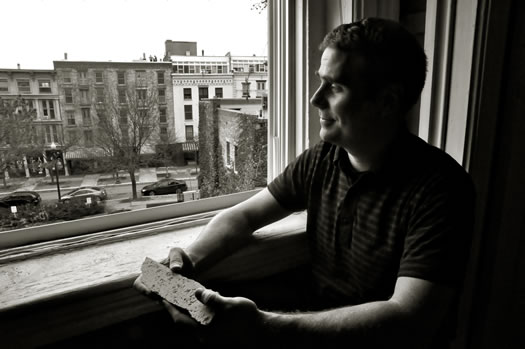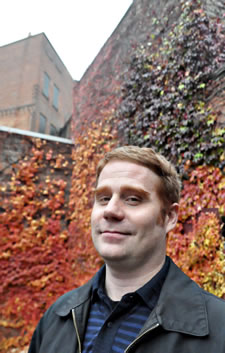Duncan Crary, downtown disciple

Duncan holds a piece of the now-demolished Troy City Hall as he looks out of his downtown Troy apartment window.
Duncan Crary has been in love with Troy since he was a child, "hatched," as he puts it, "on a cul-de-sac in the American suburbs" in Delmar.
"Suburbatory."
Maybe it was the defiant brownstones, or the alleys that time forgot, that turned his head. Most likely it was the comic-book shop on Fulton Street. Troy was where he wanted to be.
But it wasn't until his teen years, when he devoured The Geography of Nowhere, James Howard Kunstler's attack on suburban sprawl, that he understood and could articulate why.
Now 33 years old, the self-employed publicist has made a name for himself hosting and producing The KunstlerCast, a conversational podcast that has brought Crary to Saratoga Springs and Kunstler to Troy, where, for as long as an hour each week, the pair sit (or stand or walk around the neighborhood) and wax philosophic on how we've managed to turn the American Dream into a "Clusterfuck Nation."
 Crary has also recently published a companion book to the show -- The KunstlerCast: Conversations with James Howard Kunstler -- which highlights the four years of candid conversations he's had with Kunstler about his thoughts on the evils of development, our obsession with cars, the pitfalls of peak oil, the diminishing returns of the internet, and planning that puts green spaces and farms in cities and tract houses on farmland. A human habitat, the pair argues, that ruins our lives and ensures that our ruins are valueless.
Crary has also recently published a companion book to the show -- The KunstlerCast: Conversations with James Howard Kunstler -- which highlights the four years of candid conversations he's had with Kunstler about his thoughts on the evils of development, our obsession with cars, the pitfalls of peak oil, the diminishing returns of the internet, and planning that puts green spaces and farms in cities and tract houses on farmland. A human habitat, the pair argues, that ruins our lives and ensures that our ruins are valueless.
But they also laugh -- a lot.
So how does a kid from the burbs hook a big fish from the think tank world?
It all started about a decade ago when Crary was working at a smaller think tank in Albany, The Institute for Humanist Studies. One of his coworkers, a founder of Liberated Syndication (one of the companies he says helped create the mode of podcasting), encouraged him to give podcasting a try.
"I started doing a podcast for the institute promoting the philosophy of humanism ... I ended up interviewing Salman Rushdie, and Richard Dawkins, and Chris Hitchens, and Andy Rooney, and Julia Sweeney. ... I just sorta went like crazy just interviewing all these big thinkers, these kind of celebrity thought leaders. ... One of the final guests of that series I invited Jim Kunstler to be on that show to talk about the human habitat.
"We had a lot of fun and so I suggested 'You should have a podcast.'"
Kunstler wasn't interested learning any new tech tricks, but he was willing to be the subject of Duncan's efforts. "So I mulled that over for a couple of months and decided to just do this thing."
The idea, Crary said, was to get together once a month and sit down for an hour and a half, editing the content into several 15-minute episodes.
"But it just kind of exploded from there," he noted. "Some episodes are an hour long. It gets addictive."
Getting upset about sprawl, energy... and murals
Crary said, ultimately, the goal of the Kunstlercast was to introduce people to the author that got him thinking about the environment from the perspective of the human animal.
"With the book I wanted to tell the whole story of Kunstler's world view. That actually shows you how all the stuff he talks about is actually connected. That energy depletion is obviously directly connected to urban sprawl, but that designing beautiful buildings that reward the human spirit is also important and you can't just ignore that because we're having energy depletion issues.
"Even some listeners to our show will get pissed off when we take an episode and talk about public murals. Murals are just another one of these horrible bandaids that don't fix the problem of blank walls. So these peak oil collapse doomer people will be furious at us like, 'How can you be talking about public murals and art when the sky is falling.' If you really want to entice people people to move back into the communities that will have a future, that have a chance at having a future you need to reward them and you're not going to reward them with crappy murals or blank walls."
But also through the book, Crary hoped to introduce Troy to a national audience, because he believe it's a city on the right track.
"I really wanted to bring Troy to the national discussions. And I did because not only is the book doing well. ... it's selling OK, the reviews so far have been pretty good ... it's because Troy really is a great model. More people will be interested in places like this."
The on-air chemistry between Kunstler and Crary has been the subject of some derision. Listeners have accused Crary of fawning over Kunstler, handing him softball questions and acting as a foil.
Crary doesn't flinch.
"Jim is not the only contrarian whose been railing against the practices of suburbia for a long time. But he's funny about it. The stuff that comes out of his mouth just worms its way into your brain. I don't consider myself to be a malicious person. I don't try to be cruel to people, but I find his malicious wit, his cutting sense of humor, to be really appealing.
"Maybe because he's like the devil on your shoulder sometimes. Maybe not the devil but the person who has no filter. The expressions he comes up with, you can just bust them out in conversations. Sometimes you can persuade your opponent just because your expression is so funny. And it kind of takes the edge off the actual argument."
The KunstlerCast book, by Duncan Crary, published by New Society, will be available through US and Canadian booksellers in late November. Advance copies are available for sale.
Controversial topics
 Many of the Crary/Kunstler chats focus on controversial subject matter. Among them:
Many of the Crary/Kunstler chats focus on controversial subject matter. Among them:
Gentrification
"Cities were never just places for poor people," explains Crary. "People of all walks of life inhabited cities .. inhabited the same neighborhoods and sometime the same houses. They may not have socialized but they were together. ... We got into a situation now where if someone is rich and tries to get into a city people make them feel bad. That's they're pushing around poor people and not just that its the unspoken - they're pushing around black people. Who says black people need to be urban? A lot of black people who came to the cities, they were country people. They were sharecroppers who came for manufacturing jobs."
"I know some people have accused me of being a racist but at least I'm willing to talk about it. If we keep this up we're going to not only have suburbia, we're going to have exurbia ... and the more expensive gas gets the less value those places will have."
Corporate brands
"I'm not a huge fan of the mega chains stores. But I would not fight to keep them out. I don't go down the whole Mom and Pop argument route. I understand why people do, but I think that's an unnecessary argument at the moment. What's more important is that we house those businesses in buildings that can be actually be reused after they inevitably go out of business."
"If the Gap wants to come in, fine. As long as they're in like a dignified building. Like, we're sitting in a 200 year-old bank right now. I live here. This building was capable of being reused. A lot of the Target stores and Walmarts and the McDonalds buildings are disposable architecture. It's like a giant plastic cup that you just throw away after 20 years."
EMPAC
"Sometimes RPI's attitude toward technology gets expressed in architecture that I find to be out of sync with what's happening here in Troy. I think what is in sync with that is these young RPI grads who are coming down here, inhabiting old buildings and starting their tech companies.
"That EMPAC building is just a gigantic Battlestar or something. It's like it's getting a message from the mothership telling it to destroy ... It's also got an Indiana Jones thing. That's all about intimidation."
____
Siobhan shares her writing and photography at Ittybits & Pieces.
Hi there. Comments have been closed for this item. Still have something to say? Contact us.
Comments
I'm very ambivalent about a lot of his thoughts. First and foremost I'm glad to see how proud he is of being from Troy. We need more people like this in the CD that want to promote the region as a great place to live. And while he makes a great point about the disposeableness of chain-store buildings, it's hardly an "unneccesary argument" to be in favor of Mom-and-Pop stores, especially nowadays.
As for his thoughts on murals...I don't know too much about "Humanism" but I do know the great Kurt Vonneagut was one and he would never call art a "horrible bandaid" The murals that were painted in Albany this past summer are a fantastic addition to the urban landscape.
Lastly, I love EMPAC, just a personal note!
Anyways, everyone should check out this movie if they are interested in Kunstler
http://megamallfilm.com/MEGAMALL.html
... said Terrence on Nov 22, 2011 at 8:54 PM | link
The problem with Kunstler is the really out there Peak Oil stuff. For example, in one of the podcasts he berated some guy working on the Washington Square Park cobblestone street about whether all streets would be cobblestone, once oil went through the roof.
I think the point about gentrification is great, and totally agree on the murals. The fact that there's a mural on 2nd Street, across from Castle, doesn't disguise the fact that someone clearly knocked down old buildings to build a surface level parking lot.
... said Wanttobeanonymous on Nov 22, 2011 at 11:23 PM | link
To clarify and elaborate on one of my statements reported in this piece, which perhaps seems more provocative than it really is.
Yeah, I spotted a few blog comments out there on the net which casually (alarmingly so) floated the accusation of racism my way after I voiced my objection to the use of the term “urban†as a synonym for so-called “black culture†and also for so-called “ghetto culture.†I don't consider the accusation or the source it came from to be worth taking seriously.
But I brought it up because that’s a risk one takes for even stepping into racially charged topics like “white flight,†gentrification and the practice of concentrating poverty in urban areas.
I feel Americans often put more energy into finding reasons to be “offended†than we put into actually trying to work out some of our very serious issues.
(See “Stuff White People Like: #101 Being Offended http://stuffwhitepeoplelike.com/2008/05/28/101-being-offended )
We really do need to have a comprehensive discussion about our living arrangements in America, and I don’t avoid high voltage issues for fear of saying something that might “get me into trouble.â€
One reason we’re so touchy and awkward and quick to jump on each other when we discuss controversial topics is that so much of our built environment was delivered in a manner that promotes monocultures. When you’re living in a monoculture you just aren’t exposed on a daily basis to groups that are different from yourself. Misunderstandings and clumsy interactions are bound to result when people from different monocultures finally do interact.
But if our cities and towns were designed better (with more traditional mixed-uses, etc.), we’d have more opportunities to talk to each other about these issues face-to-face rather than through pixels on a screen.
Anyway, this comment is growing long, and my book and weekly podcast go into much more detail on all these things I’ve said here and in the article above.
... said Duncan Crary on Nov 25, 2011 at 11:03 AM | link